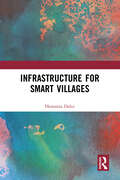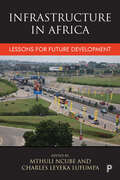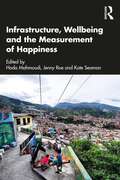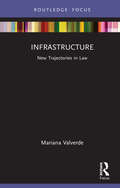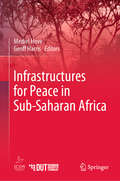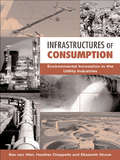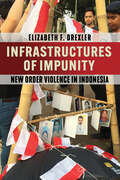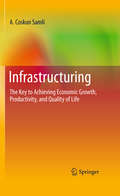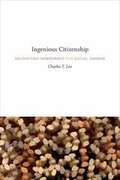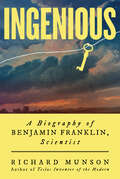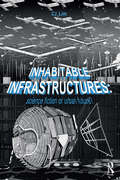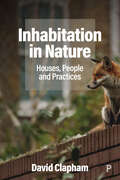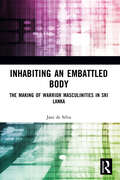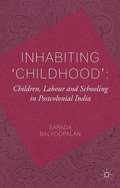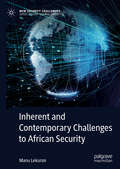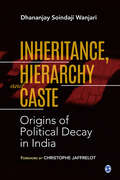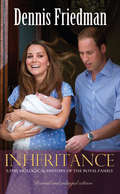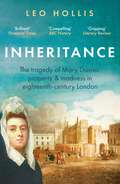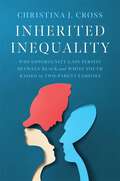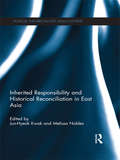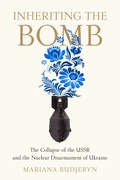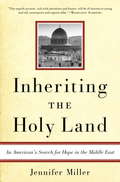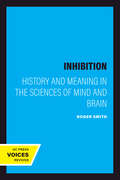- Table View
- List View
Infrastructure for Smart Villages
by Hemanta DoloiThis book intends to initiate a fresh articulation of need-based infrastructure provisions in rural contexts. Departing from the conventional theories and practices of infrastructure planning and development applied in urban settings, the book presents a comprehensive suite of technical and non-technical indicators that rationalise fit-for-purpose planning, development, and operations of rural infrastructure. Drawing from global practices in public and private sectors and research-based evidence, a distinctive argument is put forward for promoting location-specific infrastructure development from effectiveness, practicality, affordability, and sustainability perspectives. The argument encompasses wider social, cultural, and economic contexts that are unique to rural settings and the book highlights a clear roadmap of how the UN’s sustainable development goals (SDGs) are at the core of developing rural communities with necessary infrastructure provisions that are purpose-built, affordable, risk averse, and resilient.This book will provide an overview of some of the little-understood and sometimes counter-intuitive best practices on rural infrastructure and value-based priorities that have emerged in uplifting rural communities in developing economies over the last 30 years. Drawing from the global literature and practice-based evidence across a complete spectrum of relevant disciplines, this book will provide readers with a clear articulation of the innovative ideas around harnessing rural potential, and empowering rural communities with added support in growth and progressive development in the context of interconnected infrastructure systems and improved living standards. It is key reading for development, planning, and infrastructure courses as well as professionals and researchers involved in international development, aid, and provision in rural areas.
Infrastructure in Africa: Lessons for Future Development
by Mthuli Ncube & Charles Leyeka LufumpaGood infrastructure is essential for socio-economic growth and sustainable development. Safe and accessible water supplies, reliable energy, good transport networks and communications technology are all vital to a region’s development agenda. This book presents a comprehensive exploration of the state of infrastructure in Africa and provides an integrated analysis of the challenges the sector faces, based on extensive fieldwork across the continent. Contributors with a wide range of expertise challenge current policy, practice and thinking on issues including the politics of infrastructure development, social inclusion, domestic resource mobilisation and infrastructure financing. The book will be an important resource for academic researchers, students and early career development professionals as well as policymakers and NGOs engaged in dialoguing the infrastructure development options for Africa.
Infrastructure, Wellbeing and the Measurement of Happiness
by Roe Jenny Seaman Kate Mahmoudi HodaThis book takes an interdisciplinary approach to our understanding of infrastructure, and it’s influence on happiness and wellbeing, by examining the concept from economic, human development, architectural, urban planning, psychological, and ethical points of view. Providing insights from both research and practice the volume discusses how to develop happier cities and improve urban infrastructure for the wellbeing of the whole population. The book puts forth the argument that it is only in understanding the true nature of infrastructure’s reach – how it connects, supports, and enlivens human beings – that we can truly begin to understand infrastructure’s possibilities. It connects infrastructure to that most elusive of human qualities – happiness – examining the way infrastructure is fundamentally tied to human values and human well-being. The book seeks to suggest novel approaches, identify outmoded undertakings, and define new possibilities in order to maximize infrastructure’s impact for all people – with a focus on diversity, inclusion and equity. In seeking to define infrastructure broadly and examine its possibilities systematically this book brings together theory and evidence from multiple disciplinary perspectives including, sociology, urban studies, architecture, economics, and public health in order to advance a startling claim – that our lives, and the lives of others, can be substantively improved by greater adhesion to the principles and practices of infrastructure design for happiness and wellbeing.
Infrastructure: New Trajectories in Law (New Trajectories in Law)
by Mariana ValverdeThis book provides an overview and assessment of infrastructure’s legal and governance underpinnings. Infrastructure is often thought of as a term referring only to the physical entities – pipes, cables, utility poles, highways, airports – that facilitate the transmission of water, gas, telecommunications and electricity, as well as enabling both private and public transportation, and serving to house more or less public services such as health care and schools. However, infrastructure planning and implementation are not reducible to bricks and mortar. The complex process requires drawing from and sometimes re-inventing or recycling legal tools, from construction contracts to financing ‘deals’, which are often taken for granted by both practitioners and urban studies scholars. These are as important today as they were when the first railway lines were built, and to a large extent they remain just as invisible: the avalanche of drawings and photographs of planned or in-process fancy buildings tends to hide from view the behind- the-scenes negotiations and decision-making that had to happen before construction could start, and which in some cases continue afterwards. This book does not ignore the material and nonhuman aspects of infrastructure. But, focusing on the legal and governance underpinnings of infrastructure projects, via a series of key terms that refer to hybrid legal processes, the book offers an important socio-legal supplement to the current ‘infrastructure turn’. This book will be of interest to students in the areas of socio-legal studies, urban sociology, urban studies, urban geography, planning, public law, and contract law, as well as practitioners involved in infrastructure projects.
Infrastructures for Peace in Sub-Saharan Africa
by Mediel Hove Geoff HarrisCultures of violence are characteristic of many countries in sub-Saharan Africa and attempts to move towards cultures of peace have often proved difficult and ineffectual. And yet, the wide variations in levels of violence within and between countries show that it is not inevitable; rather, it is the result of choices made at individual, community and societal levels. This book examines the potential of peace infrastructures as vehicles to strengthen and spread progress towards cultures of peace. Peace infrastructures vary hugely in sophistication and level. The examples examined in this book range from tiny structures which help resolve conflicts between individuals and within community organisations, peace committees which serve local communities, peace education and peace club programmes in schools, mediation mechanisms to prevent election violence and to ministries of peace to coordinate government and non-government efforts in peacemaking and peacebuilding. The overall finding is that the development of peace infrastructures at all levels has great potential to build cultures of peace. 1. It is the only book available which documents the experience and potential of nonviolence in post-independence sub-Saharan Africa. 2. It makes a persuasive case for the development of various peace infrastructures in order to make peace sustainable. 3. It explains how strategic planning can be utilised, both to bring about change and to institutionalise it.
Infrastructures of Consumption: Environmental Innovation in the Utility Industries
by Elizabeth Shove Bas Van Vliet Heather ChappellsFor many years, a uniform and uncontested picture of utility system organization has endured across Europe. Provider and consumer roles have been largely taken for granted, and consumers have had little choice but to use the infrastructure of the only network provider available. Recent transformations have challenged this model. This book examines the ongoing environmental restructuring of consumption and provision in energy, water and waste systems. In accounting for the distinctive environmental qualities, technical features, and institutional dynamics of utility systems this book challenges contemporary conceptualizations of consumers as the autonomous drivers of environmental change. Instead, utilities and users are positioned as the 'co-managers' of utility systems, and processes of environmental innovation are seen to depend on the systemic restructuring of demand.
Infrastructures of Impunity: New Order Violence in Indonesia (Cornell Modern Indonesia Project)
by Elizabeth F. DrexlerIn Infrastructures of Impunity Elizabeth F. Drexler argues that the creation and persistence of impunity for the perpetrators of the Cold War Indonesian genocide (1965–66) is not only a legal status but also a cultural and social process. Impunity for the initial killings and for subsequent acts of political violence has many elements: bureaucratic, military, legal, political, educational, and affective. Although these elements do not always work at once—at times some are dormant while others are ascendant—together they can be described as a unified entity, a dynamic infrastructure, whose existence explains the persistence of impunity. For instance, truth telling, a first step in many responses to state violence, did not undermine the infrastructure but instead bent to it. Creative and artistic responses to revelations about the past, however, have begun to undermine the infrastructure by countering its temporality, affect, and social stigmatization and demonstrating its contingency and specific actions, policies, and processes that would begin to dismantle it. Drexler contends that an infrastructure of impunity could take hold in an established democracy.
Infrastructuring
by A. Coskun SamliThe recent global financial crisis has intensified concerns over how nations--both developed and developing -- can revitalize economic growth and ensure opportunity for prosperity to all citizens. Many analysts and policymakers alike are looking to new business creation and the promotion of entrepreneurial practices as a panacea, or at least as a partial solution. A. Coskun Samli has argued in his two most recent books that the current model of globalization tends to marginalize the poor and that developing countries must rely on local business development, rather than exogenous forces, such as aid, loans, and trade, to catalyze growth. This third book in his trilogy argues that a "bottom-up" approach is necessary for developing countries to participate in globalization--but is not sufficient. He proposes that the economic goals of a country, a region, or a company are fulfilled first and foremost by a properly designed and maintained infrastructure, encompassing both physical elements, such as transportation and communication systems, and qualitative elements, such as functioning educational, legal, and governing institutions. In Infrastructuring, Samli analyzes the experiences of a variety of countries, including China, India, Ireland, and South Africa, to highlight the role that infrastructure plays in economic development, and considers its implications for such timely issues as new business creation, productivity, and supply chain logistics. Moreover, he outlines practical approaches to infrastructure management and policy oversight.
Inge & Mira
by Marianne Fredriksson'Themes of motherhood, lost identity and the past have resonance and relevance ... The tremulous, delicate process of friendship is beautifully handled' SUNDAY TIMES'A poignant, beautifully written book' THE LADYInge is tall and cool and Mira is petite and dynamic. When they meet, each is attracted by something special and different about the other. But friendships based on the attraction of opposites can be stormy, and theirs is no exception. Blonde Inge is a native of Sweden, while dark Mira has fled there to escape the living hell of Chile at the time of the military coup led by General Pinochet. They are brought together by their mutual love of plants, but this gentle pastime is soon overshadowed by the terrible legacy of Mira's past. It is a legacy that will reach out to touch many lives, including those of Inge and Mira's children. Written with sympathy and insight and sparkling with unexpected humour, INGE & MIRA is a deeply moving tale of lives haunted by past violence.
Inge & Mira
by Marianne Fredriksson'Themes of motherhood, lost identity and the past have resonance and relevance ... The tremulous, delicate process of friendship is beautifully handled' SUNDAY TIMES'A poignant, beautifully written book' THE LADYInge is tall and cool and Mira is petite and dynamic. When they meet, each is attracted by something special and different about the other. But friendships based on the attraction of opposites can be stormy, and theirs is no exception. Blonde Inge is a native of Sweden, while dark Mira has fled there to escape the living hell of Chile at the time of the military coup led by General Pinochet. They are brought together by their mutual love of plants, but this gentle pastime is soon overshadowed by the terrible legacy of Mira's past. It is a legacy that will reach out to touch many lives, including those of Inge and Mira's children. Written with sympathy and insight and sparkling with unexpected humour, INGE & MIRA is a deeply moving tale of lives haunted by past violence.
Ingenious Citizenship: Recrafting Democracy for Social Change
by Charles T. LeeIn Ingenious Citizenship Charles T. Lee centers the daily experiences and actions of migrant domestic workers, sex workers, transgender people, and suicide bombers in his rethinking of mainstream models of social change. Bridging cultural and political theory with analyses of film, literature, and ethnographic sources, Lee shows how these abject populations find ingenious and improvisational ways to disrupt and appropriate practices of liberal citizenship. When voting and other forms of civic engagement are unavailable or ineffective, the subversive acts of a domestic worker breaking a dish or a prostitute using the strategies and language of an entrepreneur challenge the accepted norms of political action. Taken to the extreme, a young Palestinian woman blowing herself up in a Jerusalem supermarket questions two of liberal citizenship's most cherished values: life and liberty. Using these examples to critically reinterpret political agency, citizenship practices, and social transformation, Lee reveals the limits of organizing change around a human rights discourse. Moreover, his subjects offer crucial lessons in how to turn even the worst conditions and the most unstable positions in society into footholds for transformative and democratic agency.
Ingenious: A Biography of Benjamin Franklin, Scientist
by Richard MunsonThe dramatic story of an ingenious man who explained nature and created a country. Benjamin Franklin was one of the preeminent scientists of his time. Driven by curiosity, he conducted cutting-edge research on electricity, heat, ocean currents, weather patterns, chemical bonds, and plants. But today, Franklin is remembered more for his political prowess and diplomatic achievements than his scientific creativity. In this incisive and rich account of Benjamin Franklin’s life and career, Richard Munson recovers this vital part of Franklin’s story, reveals his modern relevance, and offers a compelling portrait of a shrewd experimenter, clever innovator, and visionary physicist whose fame opened doors to negotiate French support and funding for American independence. Munson’s riveting narrative explores how science underpins Franklin’s entire story—from tradesman to inventor to nation-founder—and argues that Franklin’s political life cannot be understood without giving proper credit to his scientific accomplishments.
Inhabitable Infrastructures: Science fiction or urban future?
by CJ LimInhabitable Infrastructures: Science fiction or urban future?, the follow up to Food City and Smartcities and Eco-Warriors, from one of the world’s leading urban design and architectural thinkers, explores the potential of climate change-related multi-use infrastructures that address the fundamental human requirements to protect, to provide and to participate. The stimulus for the infrastructures derives from postulated scenarios and processes gleaned from science fiction and futurology as well as the current body of scientific knowledge regarding changing environmental impacts on cities. Science fiction is interdisciplinary by nature, aggregates the past and present, and evaluates both lay opinions and professional strategies in an attempt to develop foresight and to map possible futures. The research culminates in the creation of innovative multi-use infrastructures and integrated self-sustaining support systems that meet the challenges posed through climate change and overpopulation, and the reciprocal benefits of simultaneously addressing the threat and the shaping of cities. J. G. Ballard has written that the psychological realm of science fiction is most valuable in its predictive function, and in projecting emotions into the future. The knowledge from the book is widely transferable, constituting both solutions and speculative visions of future urban environments. The book is indispensable reading for professionals and students in the fields of urban design, architecture, engineering and environmental socio-politics.
Inhabitation in Nature: Houses, People and Practices
by David ClaphamRejecting the assumption that housing and cities are separate from nature, David Clapham advances a new research framework that integrates housing with the rest of the natural world. Demonstrating the wider context of human lives and the impact of housing on the non-human environment, the author considers the impact of current inhabitation practices on climate change and biodiversity. Showcasing the significant contribution that housing policy can make in mitigating environmental problems, this book will stimulate debate amongst housing researchers and policy makers.
Inhabiting an Embattled Body: The Making of Warrior Masculinities in Sri Lanka
by Jani de SilvaThis book offers an anthropological account of Sri Lanka’s Eelam Wars III and IV. It is based on the life-narratives of ex-servicemen who fought on the frontlines. The volume approaches militarism as a practice of masculinity. It explores the sense of embattlement that young recruits feel, which stems from the inner war between notions of bodily deference instilled in childhood and having to conduct offensives on the battlefield. Thus though they wish to move smoothly into the assault techniques learnt in combat-training, they sometimes find their bodies are acting-out a different trajectory; engaging in acts of spectacular violence or simply running away. It traverses themes such as masculinity and Sinhala society, British martial masculinity vs the composed body in Sinhala discourse, combat-training and the battlefield. The author traces the ways in which troops tried to negotiate the thin line between valour and violence in a context in which the enemy’s suicide fighters engaged in the more extreme code of sacrificing-the-body, which derided the very manliness of soldiers who couldn’t prevail against them. She argues that the Sri Lankan experience has resonance for soldiers on battlefields everywhere, who become embattled when confronted by adversaries whose practice seems to diminish their own manliness. Rich in ethnographical narratives, this book will be interest scholars and researchers of war studies, gender studies, masculinity studies, peace and conflict studies, ethnic studies, political science, international relations, sociology, social anthropology, cultural studies, and South Asian studies, especially those concerned with Sri Lanka.
Inhabiting ‘Childhood’
by Sarada BalagopalanThrough a rich ethnography of street and working children in Calcutta, India, this book offers the first sustained enquiry into postcolonial childhoods, arguing that the lingering effects of colonialism are central to comprehending why these children struggle to inhabit the transition from labour to schooling.
Inherent and Contemporary Challenges to African Security (New Security Challenges)
by Manu LekunzeThis book presents a unique, comprehensive yet accessible look at security in Africa. The author provides a comprehensive review of the key security issues in Africa and offers a contemporary investigation into what security in Africa will mean for the future of Security Studies. It focuses on contemporary yet inherent security challenges facing the continent. It engages with International Relation theories, security literature and primary data from Cameroon (related to other African case studies), to situate African Security Studies in International Relations and develop a concept of security for African Security Studies. It will be essential reading for students, analysts and policy makers specializing in International Relations, Sociology, African Studies and Development Studies.
Inheritance, Hierarchy and Caste: Origins of Political Decay in India
by Dhananjay Soindaji WanjariThe growing power of business and the increasing rhetoric of the cultural–religious ideology of Hindutva have been the focus of the recent scholarly ventures seeking to explain the persistent undemocratic tendencies in India. The book argues that this traditional and pervasive analytical framework has failed to unravel the deep-rooted societal causes of the growing degeneration in political institutions. What is missed out is the increasing concentration of power in the hands of the hereditary governing class. Inheritance, Hierarchy and Caste: Origins of Political Decay in India shows how the elite-pursuit for controlling societal power, retaining hierarchy and perpetuating inheritance is making use of ideology and, thereby, undermining the democratic spirit in India and reshaping the state itself. The book underlines the realistic significance of the effective representation of the governed classes and analyses how it is critical for bringing pragmatism to the relation between the institutional and functional aspects of the democratic consolidation in India.
Inheritance: A Psychological History of the Royal Family
by Dennis FriedmanIn exploring Royal dynamics, Inheritance sheds light on problems found in any familyOn its first publication in the 1990s, Dennis Friedman's Inheritance caused a furor in England as he traced the many problems of the Royal family as it was then back to Queen Victoria's nursery, unveiling a host of psychodramas played out against a privileged background of English palaces and Scottish castles. In a post-Diana age, the arrival of a new Prince George to the seemingly stable and blissfully happy William and Kate seems to refute Fiedman's thesis--but what of the notoriously wayward Prince Harry? Many questions are raised in this book addressing the complex and turbulent royal relationships, perhaps the most fundamental being the rigid and traditional royal upbringing which still awaits the baby prince. As the royal line is followed down the generations no direct descendent is overlooked and no issue is sidestepped.
Inheritance: A Story of Property, Marriage and Madness
by Leo Hollis&‘Hollis expertly weaves together the human tragedy and high politics behind the explosion of one of the world&’s greatest cities.&’ Dan Snow In June 1701, a young widow, Mary Davies wakes up in a hotel room in Paris and finds a man in her bed. Within hours they are married. Yet three weeks later, Mary fled to London and swore that she had never agreed to the wedding. So begins one of the most intriguing stories of madness, tragic passions and the curse of inheritance. Inheritance charts the forgotten life of Mary Davies, born in London during the Great Plague of 1665, and the land that she inherited as a baby. This estate would determine the course of her tragic life. Hollis restores this history of child brides, mad heiresses, religious controversy and shady dealing. The drama culminated in a court case that determined not just the state of Mary&’s legacy, but the future of London itself. Today, Mary&’s inheritance is some of the most valuable real estate in the world.
Inherited Inequality: Why Opportunity Gaps Persist between Black and White Youth Raised in Two-Parent Families
by Christina J. CrossA groundbreaking study challenges basic tenets of US social welfare policy with proof that raising Black children in two-parent families does not close racial gaps in life outcomes.Ever since Daniel Patrick Moynihan’s controversial 1965 report on “The Negro Family,” the disadvantages of the single-parent household have been at the center of debates about racial inequality in the United States. In particular, absent fathers and single-parent homes are seen as fundamental to the “tangle of pathology” that supposedly underlies Black disadvantage. Redressing inequality thus requires interventions that promote marriage and shore up the two-parent family.Inherited Inequality is a decisive refutation of this narrative and a definitive account of the harm it has caused. Marshaling extensive longitudinal data of African American and white children from birth through young adulthood, sociologist Christina Cross demonstrates that the two-parent family is no equalizer. While growing up with two parents increases average household income and allows for more parental involvement, the resulting gains are racially skewed: Black children brought up in a two-parent home still fare much worse than their white counterparts, in school and on the job market. Thus, interventions aimed at correcting the supposed deficiencies of the Black family will not fix these inequities. To the contrary, Cross insists, focusing on family structure distracts us from the racist legacies and logics that persistently leave African Americans with fewer resources and opportunities, regardless of who raises them.The first comprehensive empirical study of its kind, Inherited Inequality is a resounding repudiation of welfare policies that, to this day, favor marriage counseling over economic assistance. More than that, it is a provocative invitation to rethink the meaning of family in Black communities.
Inherited Responsibility and Historical Reconciliation in East Asia (Political Theories in East Asian Context)
by Jun-Hyeok Kwak and Melissa NoblesContemporary East Asian societies are still struggling with complex legacies of colonialism, war and domination. Years of Japanese imperial occupation followed by the Cold War have entrenched competing historical understandings of responsibility for past crimes in Korea, China, Japan and elsewhere in the region. In this context, even the impressive economic and cultural networks that have developed over the past sixty years have failed to secure peaceful coexistence and overcome lingering attitudes of distrust and misunderstanding in the region. This book examines the challenges of historical reconciliation in East Asia, and, in doing so, calls for a reimagining of how we understand both historical identity and responsibility. It suggests that by adopting a ‘forward-looking’ approach that eschews obsession with the past, in favour of a reflective and deliberative engagement with history, real progress can be made towards peaceful coexistence in East Asia. With chapters that focus on select experiences from East Asia, while simultaneously situating them within a wider comparative perspective, the contributors to this volume focus on the close relationship between reconciliation and ‘inherited responsibility’ and reveal the contested nature of both concepts. Finally, this volume suggests that historical reconciliation is essential for strengthening mutual trust between the states and people of East Asia, and suggests ways in which such divisive legacies of conflict can be overcome. Providing both an overview of the theoretical arguments surrounding reconciliation and inherited responsibility, alongside examples of these concepts from across East Asia, this book will be valuable to students and scholars interested in Asian politics, Asian history and international relations more broadly.
Inheriting the Bomb: The Collapse of the USSR and the Nuclear Disarmament of Ukraine (Johns Hopkins Nuclear History and Contemporary Affairs)
by Mariana BudjerynThe collapse of the Soviet Union unleashed the specter of the largest wave of nuclear proliferation in history. Why did Ukraine ultimately choose the path of nuclear disarmament?The collapse of the Soviet Union in 1991 left its nearly 30,000 nuclear weapons spread over the territories of four newly sovereign states: Belarus, Kazakhstan, the Russian Federation, and Ukraine. This collapse cast a shadow of profound ambiguity over the fate of the world's largest arsenal of the deadliest weapons ever created. In Inheriting the Bomb, Mariana Budjeryn reexamines the history of nuclear predicament caused by the Soviet collapse and the subsequent nuclear disarmament of the non-Russian Soviet successor states.Although Belarus and Kazakhstan renounced their claim to Soviet nuclear weapons, Ukraine proved to be a difficult case: with its demand for recognition as a lawful successor state of the USSR, a nuclear superpower, the country became a major proliferation concern. And yet by 1994, Ukraine had acceded to the Treaty on the Non-proliferation of Nuclear Weapons (NPT) as a non-nuclear-weapon state and proceeded to transfer its nuclear warheads to Russia, which emerged as the sole nuclear successor of the USSR. How was this international proliferation crisis averted? Drawing on extensive archival research in the former Soviet Union and the United States, Budjeryn uncovers a fuller and more nuanced narrative of post-Soviet denuclearization. She reconstructs Ukraine's path to nuclear disarmament to understand how its leaders made sense of the nuclear armaments their country inherited. Among the various factors that contributed to Ukraine's nuclear renunciation, including diplomatic pressure from the United States and Russia and domestic economic woes, the NPT stands out as a salient force that provided an international framework for managing the Soviet nuclear collapse.
Inheriting the Holy Land: An American's Search for Hope in the Middle East
by Jennifer MillerWriting with fierce honesty, Jennifer Miller has created an extraordinary synthesis of history, reportage, and coming-of-age memoir in Inheriting the Holy Land. Her groundbreaking perspective on the conflict is presented through interviews with young Israelis and Palestinians and conversations with some of the most influential officials involved in the Middle East, including Shimon Peres, Yasir Arafat, James Baker, Benjamin Netanyahu, Colin Powell, Ehud Barak, and Mahmoud Abbas. This book will open eyes, open hearts, and open minds. Miller grew up in an affluent suburb of Washington, D.C., surrounded by the chaotic politics of the Middle East. Her father was a U.S. State Department negotiator at the Oslo and Camp David peace summits, and dinnertime conversation in the Miller household often included discussions of the Middle Eastern conflict. When Miller joined Seeds of Peace, a program that brings Middle Eastern kids to Maine for intensive sessions of conflict resolution, her real experience with the Middle East began. As she befriended young Palestinians, Israelis, Egyptians, and Jordanians, Jennifer came to realize that their views were missing from the ongoing debate over the Holy Land. By helping these young voices be heard, she knew she could reveal something vitally new and deeply challenging about the future of this torn region. Miller, however, learned fast that it was one thing to hang out at the idyllic Seeds for Peace camp in Maine and quite another to confront young people on their own turf-in the alleys of East Jerusalem, behind the armed gates of West Bank settlements, in the teeming refugee camps of Gaza. Friendships that had blossomed in the United States withered in the aftermath of yet another suicide bombing. Big-hearted teens on both sides of the conflict shocked Miller with the ferocity of their illusions and the twisted logic of their misconceptions. But she also found rays of hope in places where others had reported only despair--surprising open-mindedness among the ultra-religious, common ground shared by those who had lost loved ones to the violence, a yearning for peace amid the rubble of refugee camps and the shards of bombed cities. A deft writer, she interweaves her startlingly candid interviews with the vibrant realities of life in the streets. Just as Jennifer Miller was forced to confront her biases as an American, a Jew, a woman, and a journalist, in Inheriting the Holy Land, she similarly challenges readers to reexamine their own cherished prejudices and assumptions.
Inhibition: History and Meaning in the Sciences of Mind and Brain
by Roger SmithIn everyday parlance, "inhibition" suggests repression, tight control, the opposite of freedom. In medicine and psychotherapy the term is commonplace, its definition understood. Relating how inhibition—the word and the concept—became a bridge between society at large and the natural sciences of mind and brain, Smith constructs an engagingly original history of our view of ourselves.Not until the late nineteenth century did the term "inhibition" become common in English, connoting the dependency of reason and of civilization itself on the repression of "the beast within." This usage followed a century of Enlightenment thought about human nature and the nature of the human mind. Smith traces theories of inhibitory control from the moralistic psychologies of the early nineteenth century to the famous twentieth-century schools of Sherrington, Pavlov, and Freud. He finds that the meanings of "inhibition" cross disciplinary boundaries and outline the growth of our belief in the self-regulated person.
